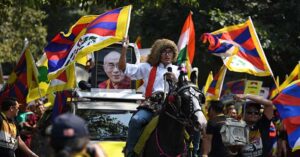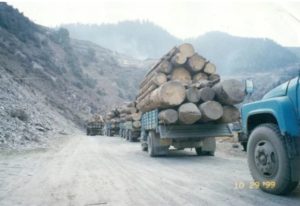
Tibetans during the anniversary of 60th Tibetan Uprising Day on March 10, 2019
Photo: Sajjad Hussain/AFP
In the wake of the commemoration of the 60th anniversary of the failed uprising in Tibet in 1959, China published a White Paper last month entitled Democratic Reform in Tibet; Sixty Years On which includes China’s usual message of developments, progresses and prosperities in Tibet and the peaceful liberation of Tibetan people under Chinese rule from its former feudal and serfdom society.
The White Paper states that Tibetan people have moved from a dark history of feudal society into a new era and became the masters of their own affairs. It claims that in the last 60 years of democratic reforms under the guidance of the Communist Party of China (CPC), Tibetans have enjoyed a large development of the economy accompanied by religious freedom, together with equality and respect for all ethnic cultural and language diversity. The paper also claimed huge infrastructure development and improved productive forces thus accomplishing fundamental changes in the economic structure.
The Central Tibetan Administration (CTA) in Indiasays thatthis White Paper is a part of systematic attempt by the CPC to whitewash their destruction of Tibetan life, culture, language and environment through its policy of continuous repression and culture assimilation. Over 150 Tibetans from different parts of Tibet have self-immolated to protest against China’s repressive policies. CTA spokesperson, Secretary of the Department of Information and International Relations, Mr Sonam Norbu Dakpo said China has turned Tibet into “an area of neo-colonialism”.
Mr Zamlha Tenpa Gyaltsen, an environment research fellow at the Tibet Policy Institute of the CTA,has rebutted the Chinese accusation of Tibetan people’s inability to exploit their natural resources before the Chinese invasion by citing a series of events which demonstrate the continued destruction of Tibet’s environment under Chinese administration, including the mass hunting of wildlife, large-scale deforestation and unchecked developments such as large mining projects and the damming of Tibet’s rivers which have resulted in high levels of water pollution leading to an ecological disaster on the Tibetan plateau.
The United Nations Committee on the Elimination of Racial Discrimination has reported that Tibetans are highly restricted in their movements within and beyond the Tibet borders, are denied the right to acquire passports and travel abroad and experience significant restrictions on receiving teaching in the Tibetan language. Such discriminatory and restrictive policies violate the right to free movement and right to information, which is in direct contradiction to the claims made by China’s White Paper.
Freedom House, the United States government-funded non-government organisation that conducts research and advocacy on democracy, political freedom, and human rights, has reported Tibet as the least free country in the world in terms of political rights and civil liberties in its Freedom in the World 2019 report. There were no free and fair elections: a group of unelected Han Chinese officials hold all the decision-making power in the Tibet Autonomous Region (TAR); in addition, the organisation of any political party or political activity other than the Chinese Communist Party is illegal and harshly punished. China’s economy and infrastructure development, the report says, has marginalised Tibetans from enjoying the benefits of the development that has taken place. “The economy is dominated by state-owned enterprises and private businesses with informal ties to officials. Tibetans reportedly find it more difficult than ethnic Chinese residents to obtain permits and loans to open businesses” the report says.
The Tibetan language and culture have been under serious threat by the development of infrastructure and better transport facilities that have flooded Tibet with Chinese migrants, and the repressive policies of the People’s Republic of China. After the successful abolition of the presidential time limit and the elimination of his political rivals through his anti-corruption campaign, Xi Jinping has effectively shrunk political liberty and freedom of speech throughout China.





 Print
Print Email
Email